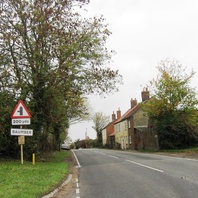
Viking Names
Baumber
Baumber, in the Gartree Wapentake of Lincolnshire, likely comes from the Old English male personal name Badda and the Old English element burh ‘a fortified place’.
Read More
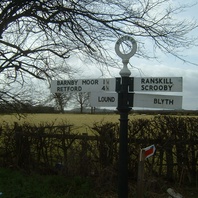
Viking Names
Scrooby
The name of Scrooby probably comes from the Old Norse female personal name Skroppa and the Old Norse element by ‘farm, settlement’.
Read More
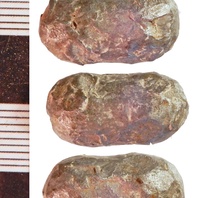
Viking Objects
Silver Ingot (NLM-ABB952)
This silver ingot was made by melting down worked silver and casting it in a mould. The Vikings arriving in England had a bullion economy in which they paid for goods with silver that was weighed to an amount agreed between the buyer and the seller. Hacksilver and silver ingots are the most common evidence for their bullion economy. It took some time for the Scandinavian settlers to adopt a monetary economy like that of the Anglo-Saxons, and both systems were used simultaneously for a while before they fully adopted the new system. The Vikings were familiar with monetary economies but they treated coins as just another form of silver before adoption of a monetary economy.
Read More
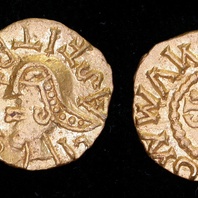
Viking Objects
Merovingian Tremissis (LEIC-6BAA60)
This Merovingian gold tremissis was minted in Bourges in the late 6th or 7th century. It is possible that it made its way to England prior to Viking incursions but it is equally likely that the Vikings brought this coin with them as plunder after raiding in Frankia.
Read More
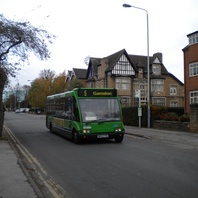
Viking Names
Gamston
Gamston, in the Bassetlaw Wapentake of Nottinghamshire, is a hybrid name from the Old Norse male personal name Gamall and Old English tun ‘an enclosure; a farmstead; a village; an estate’.
Read More
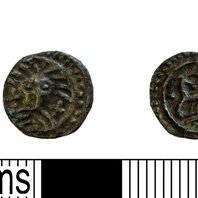
Viking Objects
Danish Silver Sceat (NARC-70AFF4)
This silver sceat is classified as part of the Danish Series X Type 31. The obverse depicts the head of Woden with crosses to either side of a rounded beard and pellet above. The reverse depicts a monster facing left. These coins are considered to be associated with the early trading center at Ribe. It is very likely that they made their way to England by means of Vikings.
Read More
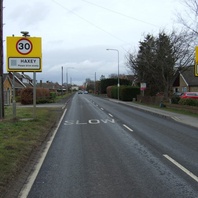
Viking Names
Haxey
Haxey, in the West Riding of Lindsey in Lincolnshire comes from the Old Norse male personal name Haki and Old Norse ey ‘an island’ or Old English eg ‘an island or well-watered land’ which most frequently refers to dry ground surrounded by marsh. The place-name aptly describes the location as Haxey sits on a low-lying hill surrounded marshland.
Read More
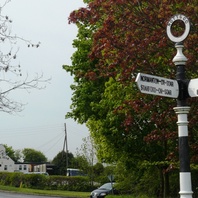
Viking Names
East Leake
East Leake in Rushcliffe Wapentake of Nottinghamshire, is a simplex name from Old Norse lœkr ‘brook’. East and West Leake are on the banks of a small stream which joins the Soar at Kingston.
Read More
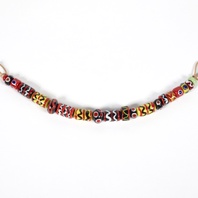
Viking Objects
Reproduction Baltic Glass Beads
This glass-bead set is based on originals from Ribe/Hedeby and the Baltic and were meant to be worn between oval brooches. Glass beads were a coveted item with some being imported from as far away as the Middle East. They were manufactured by specialised artisans who would heat various coloured glass rods over a furnace and melt the glass onto a metal stick to form different shaped beads.
Read More
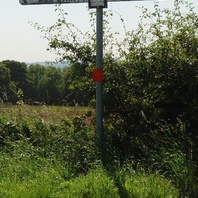
Viking Names
Saxby All Saints
Saxby All Saints, in the Yarborough Wapentake of Lincolnshire, probably takes its name from the Old Norse and Old Danish male personal name Saksi and the Old Norse element by ‘farmstead, village’. This personal name is very common throughout Lincolnshire and Norfolk. Alternatively, the first element of the place-name could be a Scandinavian gen. pl. form of an ethnonym: Old English S(e)axe, Old Norse Saksar ‘Saxons’. Thus the place-name would mean ‘Saxons’ farm/settlement’. The exact implications of such a name are not yet fully understood and are the subject of ongoing work by Dr Jayne Carroll of the Institute for Name-Studies, University of Nottingham. All Saints was affixed at a later date from the dedication of the church.
Read More

Viking Names
Clipstone
Clipstone, in the Bassetlaw Wapentake of Nottinghamshire, is a hybrid name. The first element is the Old Norse male personal name Klyppr as in Clipston, Northamptonshire, and Clipston on the Wolds, Nottinghamshire. It is on record as Clip, the name of a tenth-century moneyer. The second element is Olclid English tun ‘ enclosure; a farmstead; a village; an estate’ and it is thus another hybrid name.
